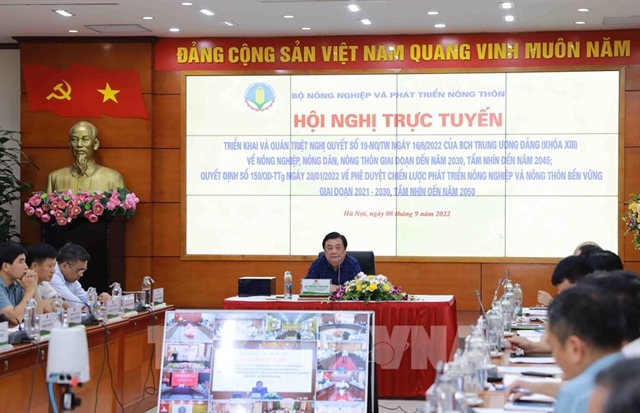 Economy
Economy
.jpg)

|
| Minister of Agriculture and Rural Development Lê Minh Hoan chairs an online conference on implementing and mastering Resolution No.19 on agriculture, farmers, rural areas yesterday. VNA/VNS Photo |
HÀ NỘI — A new resolution on agriculture, farmers and rural areas will enhance the development to improve the living standards of farming households, Minister of Agriculture and Rural Development Lê Minh Hoan said at an online conference introducing Resolution No. 19-NQ/TW.
The first key solution is to improve the role, position, ownership capability, and the lives of rural residents, he said.
The minister said that the resolution promotes the role of farmers and considers them the centre of the development process.
In the context of the Fourth Industrial Revolution and digital transformation, the resolution sets higher requirements in raising knowledge and awareness and ensuring farmers' ownership.
Digital transformation is opening up a bright future for Vietnamese agriculture by applying new tools in production.
At the meeting, the participants shared experiences and recommendations on shifting from agricultural production to an agricultural economy.
Nguyễn Hồng Sơn, Director of the Vietnam Academy of Agricultural Sciences, said that it is necessary to restructure agriculture by applying science and technology.
Agricultural development also creates conditions for the development of farmers and rural areas and vice versa.
The resolution stated that science and technology have the task of creating high-value products and breakthroughs and training high-quality human resources.
The agency will coordinate with relevant units and businesses to transfer technological advances and train farmers, promoting the application of high technology in agriculture, increasing the value of products, and creating breakthroughs in the agriculture sector, Sơn said.
Reports from the Ministry of Agriculture and Rural Development said the ministry has built 1,669 supply chains of safe agro-forestry-fishery foods and checked post-harvest samples. As a result, food safety violations are low (from 1.6 to 2.5 per cent).
Agricultural cooperatives also operate more effectively with an increase in the number of members and the application of technology in production and business.
The number of "One Commune, One Product" (OCOP) products from three stars reached 8,340, creating favourable conditions for businesses to promote and consume their products.
Based on the strengths and development potential of the locality, Vice Chairwoman of Bắc Kạn Provincial People's Committee Đỗ Thị Minh Hoa said the province is determined to build two main industries to become a national commodity; forestry and medicine.
In Bắc Kạn, the forest land area accounts for more than 85 per cent of the province's area, with the highest forest coverage rate in the country at 73.4 per cent.
Currently, planted forests in the province do not yet bring high economic efficiency.
To develop the forestry sector sustainably, the industry needs to have specific directions, such as planting trees under the forest canopy and prolonging the logging cycle.
Forests are mainly assigned to organisations and households for management and protection, but the households' income from forest protection is not high.
It is necessary to have policies to promote forest protection effectively, Hoa said. VNS
.jpg)



